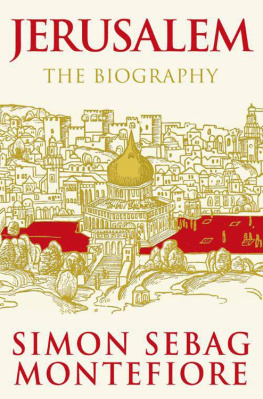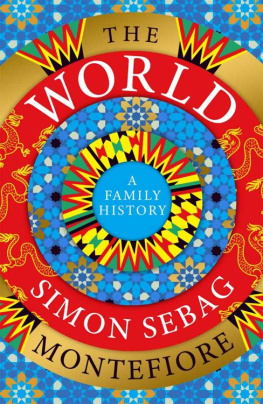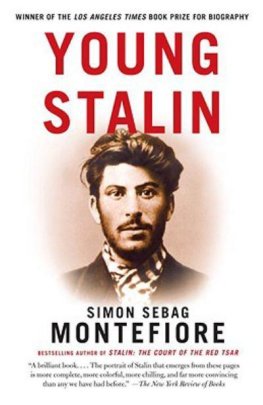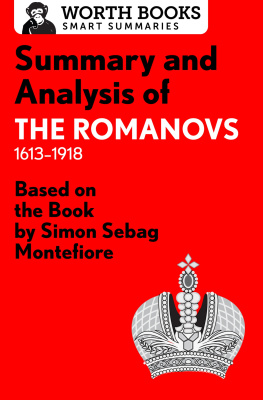Simon Sebag Montefiore - Jerusalem: The Biography
Here you can read online Simon Sebag Montefiore - Jerusalem: The Biography full text of the book (entire story) in english for free. Download pdf and epub, get meaning, cover and reviews about this ebook. year: 2011, publisher: Orion Books, genre: Science. Description of the work, (preface) as well as reviews are available. Best literature library LitArk.com created for fans of good reading and offers a wide selection of genres:
Romance novel
Science fiction
Adventure
Detective
Science
History
Home and family
Prose
Art
Politics
Computer
Non-fiction
Religion
Business
Children
Humor
Choose a favorite category and find really read worthwhile books. Enjoy immersion in the world of imagination, feel the emotions of the characters or learn something new for yourself, make an fascinating discovery.
- Book:Jerusalem: The Biography
- Author:
- Publisher:Orion Books
- Genre:
- Year:2011
- Rating:5 / 5
- Favourites:Add to favourites
- Your mark:
- 100
- 1
- 2
- 3
- 4
- 5
Jerusalem: The Biography: summary, description and annotation
We offer to read an annotation, description, summary or preface (depends on what the author of the book "Jerusalem: The Biography" wrote himself). If you haven't found the necessary information about the book — write in the comments, we will try to find it.
Simon Sebag Montefiore: author's other books
Who wrote Jerusalem: The Biography? Find out the surname, the name of the author of the book and a list of all author's works by series.
Jerusalem: The Biography — read online for free the complete book (whole text) full work
Below is the text of the book, divided by pages. System saving the place of the last page read, allows you to conveniently read the book "Jerusalem: The Biography" online for free, without having to search again every time where you left off. Put a bookmark, and you can go to the page where you finished reading at any time.
Font size:
Interval:
Bookmark:
Catherine the Great and Potemkin
Stalin: The Court of the Red Tsar
Young Stalin
Sashenka
THE BIOGRAPHY
Simon Sebag Montefiore

To my darling daughter
Lily Bathsheba
The view of Jerusalem is the history of the world; it is more; it is the history of heaven and earth.
Benjamin Disraeli, Tancred
The city has been destroyed, rebuilt, destroyed and rebuilt again. Jerusalem is an old nymphomaniac who squeezes lover after lover to death, before shrugging him off her with a yawn, a black widow who devours her mates while they are still penetrating her.
Amos Oz, A Tale of Love and Darkness
The Land of Israel is the centre of the world; Jerusalem is the centre of the Land; the Holy Temple is the centre of Jerusalem; the Holy of Holies is the centre of the Holy Temple; the Holy Ark is the centre of the Holy of Holies and the Foundation Stone from which the world was established is before the Holy Ark.
Midrash Tanhuma, Kedoshim 10
The sanctuary of the earth is Syria; the sanctuary of Syria is Palestine; the sanctuary of Palestine is Jerusalem; the sanctuary of Jerusalem is the Mount; the sanctuary of the Mount is the place of worship; the sanctuary of the place of worship is the Dome of the Rock.
Thaur ibn Yazid, Fadail
Jerusalem is the most illustrious of cities. Still Jerusalem has some disadvantages. Thus it is reported Jerusalem is a golden goblet full of scorpions.
Muqaddasi, Description of Syria including Palestine
SECTION ONE
SECTION TWO
SECTION THREE
SECTION FOUR
The history of Jerusalem is the history of the world, but it is also the chronicle of an often penurious provincial town amid the Judaean hills. Jerusalem was once regarded as the centre of the world and today that is more true than ever: the city is the focus of the struggle between the Abrahamic religions, the shrine for increasingly popular Christian, Jewish and Islamic fundamentalism, the strategic battlefield of clashing civilizations, the front line between atheism and faith, the cynosure of secular fascination, the object of giddy conspiracism and internet myth-making, and the illuminated stage for the cameras of the world in the age of twenty-four-hour news. Religious, political and media interest feed on each other to make Jerusalem more intensely scrutinized today than ever before.
Jerusalem is the Holy City, yet it has always been a den of superstition, charlatanism and bigotry; the desire and prize of empires, yet of no strategic value; the cosmopolitan home of many sects, each of which believes the city belongs to them alone; a city of many names yet each tradition is so sectarian it excludes any other. This is a place of such delicacy that it is described in Jewish sacred literature in the feminine always a sensual, living woman, always a beauty, but sometimes a shameless harlot, sometimes a wounded princess whose lovers have forsaken her. Jerusalem is the house of the one God, the capital of two peoples, the temple of three religions and she is the only city to exist twice in heaven and on earth: the peerless grace of the terrestrial is as nothing to the glories of the celestial. The very fact that Jerusalem is both terrestrial and celestial means that the city can exist anywhere: new Jerusalems have been founded all over the world and everyone has their own vision of Jerusalem. Prophets and patriarchs, Abraham, David, Jesus and Muhammad are said to have trodden these stones. The Abrahamic religions were born there and the world will also end there on the Day of Judgement. Jerusalem, sacred to the Peoples of the Book, is the city of the Book: the Bible is, in many ways, Jerusalems own chronicle and its readers, from the Jews and early Christians via the Muslim conquerors and the Crusaders to todays American evangelists, have repeatedly altered her history to fulfil biblical prophecy.
When the Bible was translated into Greek then Latin and English, it became the universal book and it made Jerusalem the universal city. Every great king became a David, every special people were the new Israelites and every noble civilization a new Jerusalem, the city that belongs to no one and exists for everyone in their imagination. And this is the citys tragedy as well as her magic: every dreamer of Jerusalem, every visitor in all ages from Jesus Apostles to Saladins soldiers, from Victorian pilgrims to todays tourists and journalists, arrives with a vision of the authentic Jerusalem and then is bitterly disappointed by what they find, an ever-changing city that has thrived and shrunk, been rebuilt and destroyed many times. But since this is Jerusalem, property of all, only their image is the right one; the tainted, synthetic reality must be changed; everyone has the right to impose their Jerusalem on Jerusalem and, with sword and fire, they often have.
Ibn Khaldun, the fourteenth-century historian who is both participant and source for some of the events related in this book, noted that history is so eagerly sought after. The men in the street aspire to know it. Kings and leaders vie for it. This is especially true for Jerusalem. It is impossible to write a history of this city without acknowledging that Jerusalem is also a theme, a fulcrum, a spine even, of world history. At a time when the power of internet mythology means that the hi-tech mouse and the curved sword can both be weapons in the same fundamentalist arsenal, the quest for historical facts is even more important now than it was for Ibn Khaldun.
A history of Jerusalem must be a study of the nature of holiness. The phrase Holy City is constantly used to describe the reverence for her shrines, but what it really means is that Jerusalem has become the essential place on earth for communication between God and man.
We must also answer the question: of all the places in the world, why Jerusalem? The site was remote from the trade routes of the Mediterranean coast; it was short of water, baked in the summer sun, chilled by winter winds, its jagged rocks blistered and inhospitable. But the selection of Jerusalem as the Temple city was partly decisive and personal, partly organic and evolutionary: the sanctity became ever more intense because she had been holy for so long. Holiness requires not just spirituality and faith but also legitimacy and tradition. A radical prophet presenting a new vision must explain the centuries that have gone before and justify his own revelation in the accepted language and geography of holiness the prophecies of earlier revelations and the sites already long revered. Nothing makes a place holier than the competition of another religion.
Many atheistic visitors are repelled by this holiness, seeing it as infectious superstition in a city suffering a pandemic of righteous bigotry. But that is to deny the profound human need for religion without which it is impossible to understand Jerusalem. Religions must explain the fragile joys and perpetual anxieties that mystify and frighten humanity: we need to sense a greater force than ourselves. We respect death and long to find meaning in it. As the meeting-place of God and man, Jerusalem is where these questions are settled at the Apocalypse the End of Days, when there will be war, a battle between Christ and anti-Christ, when the Kaaba will come from Mecca to Jerusalem, when there will be judgement, resurrection of the dead and the reign of the Messiah and the Kingdom of Heaven, the New Jerusalem. All three Abrahamic religions believe in the Apocalypse, but the details vary by faith and sect. Secularists may regard all this as antique gobbledegook, but, on the contrary, such ideas are all too current. In this age of Jewish, Christian and Muslim fundamentalism, the Apocalypse is a dynamic force in the worlds febrile politics.
Font size:
Interval:
Bookmark:
Similar books «Jerusalem: The Biography»
Look at similar books to Jerusalem: The Biography. We have selected literature similar in name and meaning in the hope of providing readers with more options to find new, interesting, not yet read works.
Discussion, reviews of the book Jerusalem: The Biography and just readers' own opinions. Leave your comments, write what you think about the work, its meaning or the main characters. Specify what exactly you liked and what you didn't like, and why you think so.






